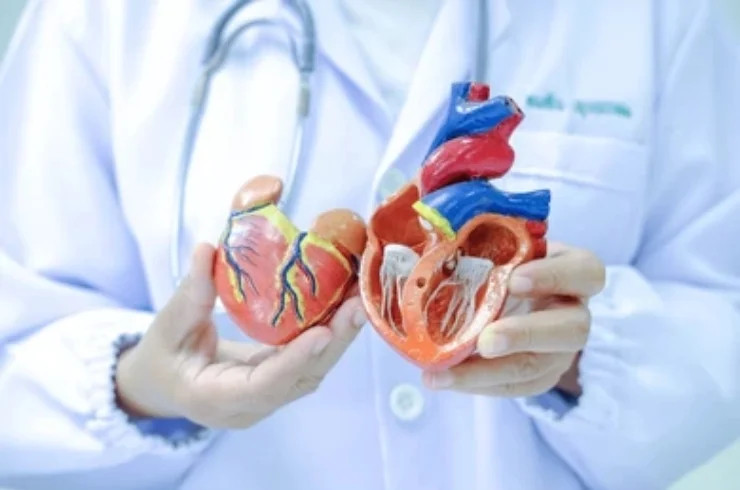Valvular Heart Disease

Valvular Heart Disease refers to any condition that affects one or more of the heart’s four valves—mitral, aortic, tricuspid, and pulmonary. These valves regulate blood flow through the heart and ensure it moves in the right direction. When a valve doesn’t open or close properly, it disrupts blood flow and puts extra strain on the heart.
Types of Valvular Heart Disease
Valvular heart disease can be classified into the following types:
- Stenosis: The valve becomes stiff or narrow, making it difficult for blood to flow through.
- Regurgitation (or Insufficiency): The valve doesn’t close properly, causing blood to leak backward.
- Prolapse: A valve, typically the mitral valve, bulges back into the heart chamber instead of closing tightly.
What Causes Valvular Heart Disease?
Valvular heart disease can develop due to:
- Congenital Defects: Conditions present from birth, such as a bicuspid aortic valve.
- Rheumatic Fever: A complication of untreated strep throat that damages the heart valves.
- Age-Related Changes: Wear and tear on the valves, often leading to calcification.
- Infections: Such as infective endocarditis, which can damage valve tissue.
- Heart Conditions: Like high blood pressure or heart attacks, which put stress on the valves.
Symptoms of Valvular Heart Disease
While mild cases may show no symptoms, advanced valvular disease can cause:
- Shortness of breath, especially during exertion or lying down.
- Chest pain or discomfort.
- Fatigue and inability to perform routine activities.
- Heart palpitations or irregular heartbeat.
- Swelling (edema) in the ankles, feet, or abdomen.
- Dizziness or fainting spells.
If you experience any of these symptoms, consult a cardiologist for evaluation.
How is Valvular Heart Disease Diagnosed?
Diagnosing valvular heart disease involves a thorough examination and advanced diagnostic tests such as:
- 2D Echo: Provides a detailed view of valve structure and function.
- ECG: Identifies irregular heart rhythms.
- TMT (Treadmill Test): Assesses how the heart performs under stress.
- Angiogram: Helps evaluate blood flow and heart function.
Treatment Options for Valvular Heart Disease
Treatment depends on the severity and type of the condition:
- Medications: Help manage symptoms like high blood pressure or irregular heartbeats.
- Valve Repair: A surgical procedure to fix the faulty valve without replacing it.
- Valve Replacement: Replacing the damaged valve with a mechanical or biological valve.
- Minimally Invasive Procedures: Such as balloon valvuloplasty or TAVI (Transcatheter Aortic Valve Implantation).
Can Valvular Heart Disease Be Prevented?
While not all cases are preventable, you can lower your risk by:
- Maintaining good oral hygiene to reduce infection risk.
- Managing conditions like high blood pressure, diabetes, and cholesterol.
- Treating strep throat promptly to avoid complications like rheumatic fever.
- Staying physically active and avoiding smoking.
Why Choose Kurnool Cardiac Center for Valvular Heart Disease Care?
At Kurnool Cardiac Center, we specialize in the diagnosis and treatment of valvular heart disease. Led by expert cardiologist Dr. Nagendra Prasad Thota, our team combines state-of-the-art technology with personalized care to ensure the best outcomes for our patients.
Your heart deserves the best care. Book your consultation today and take a step toward a healthier heart!
Treatments
- ECG
- 2D Echo
- TMT (Treadmill Test)
- Angiogram
- Angioplasty
- Bypass Surgery
- Heart Failure
- Valvular Heart Diseas
- Arrhythmias
- Cardiomyopathy
- Congenital Heart Defects
- Lipid Disorders
- Coronary Artery Disease
- Coronary Angioplasty and Stenting
- Percutaneous Coronary Intervention
- Coronary Artery Bypass Grafting
- Mitral Valve Repair or Replacement
- Atrial Septal Defect Closure
Consult Kurnool’s Leading Heart Specialist
Reach out to Kurnool Cardiac Center and meet Dr. Nagendra Prasad Thota for advanced diagnostics and treatment.
